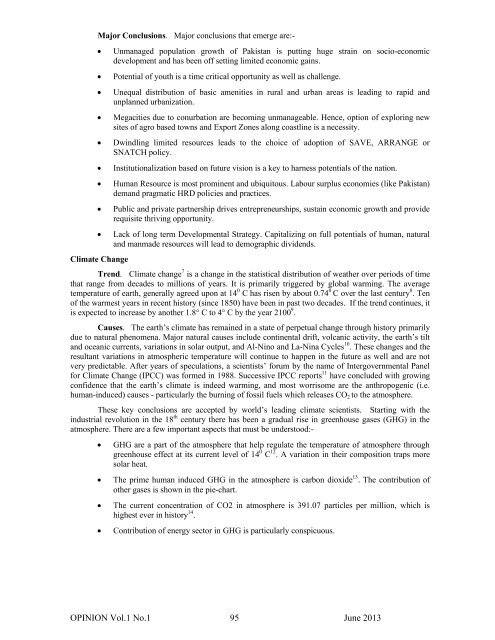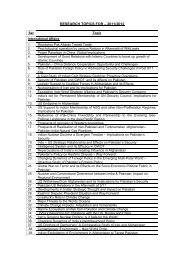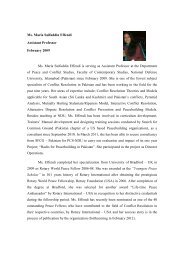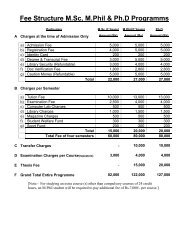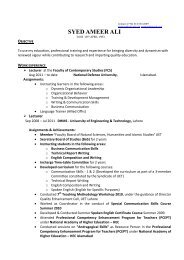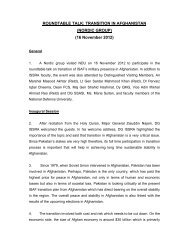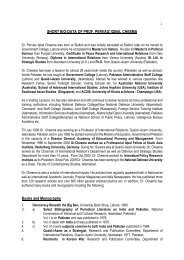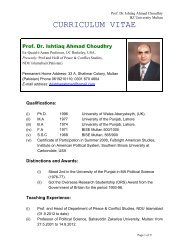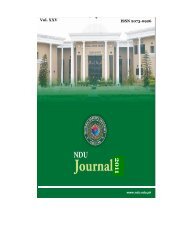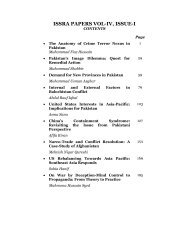OPINION Vol.1, No.1 June 2013 - National Defence University
OPINION Vol.1, No.1 June 2013 - National Defence University
OPINION Vol.1, No.1 June 2013 - National Defence University
Create successful ePaper yourself
Turn your PDF publications into a flip-book with our unique Google optimized e-Paper software.
Major Conclusions. Major conclusions that emerge are:-<br />
<br />
<br />
<br />
<br />
<br />
<br />
<br />
<br />
<br />
Climate Change<br />
Unmanaged population growth of Pakistan is putting huge strain on socio-economic<br />
development and has been off setting limited economic gains.<br />
Potential of youth is a time critical opportunity as well as challenge.<br />
Unequal distribution of basic amenities in rural and urban areas is leading to rapid and<br />
unplanned urbanization.<br />
Megacities due to conurbation are becoming unmanageable. Hence, option of exploring new<br />
sites of agro based towns and Export Zones along coastline is a necessity.<br />
Dwindling limited resources leads to the choice of adoption of SAVE, ARRANGE or<br />
SNATCH policy.<br />
Institutionalization based on future vision is a key to harness potentials of the nation.<br />
Human Resource is most prominent and ubiquitous. Labour surplus economies (like Pakistan)<br />
demand pragmatic HRD policies and practices.<br />
Public and private partnership drives entrepreneurships, sustain economic growth and provide<br />
requisite thriving opportunity.<br />
Lack of long term Developmental Strategy. Capitalizing on full potentials of human, natural<br />
and manmade resources will lead to demographic dividends.<br />
Trend. Climate change 7 is a change in the statistical distribution of weather over periods of time<br />
that range from decades to millions of years. It is primarily triggered by global warming. The average<br />
temperature of earth, generally agreed upon at 14 0 C has risen by about 0.74 0 C over the last century 8 . Ten<br />
of the warmest years in recent history (since 1850) have been in past two decades. If the trend continues, it<br />
is expected to increase by another 1.8° C to 4° C by the year 2100 9 .<br />
Causes. The earth’s climate has remained in a state of perpetual change through history primarily<br />
due to natural phenomena. Major natural causes include continental drift, volcanic activity, the earth’s tilt<br />
and oceanic currents, variations in solar output, and Al-Nino and La-Nina Cycles 10 . These changes and the<br />
resultant variations in atmospheric temperature will continue to happen in the future as well and are not<br />
very predictable. After years of speculations, a scientists’ forum by the name of Intergovernmental Panel<br />
for Climate Change (IPCC) was formed in 1988. Successive IPCC reports 11 have concluded with growing<br />
confidence that the earth’s climate is indeed warming, and most worrisome are the anthropogenic (i.e.<br />
human-induced) causes - particularly the burning of fossil fuels which releases CO 2 to the atmosphere.<br />
These key conclusions are accepted by world’s leading climate scientists. Starting with the<br />
industrial revolution in the 18 th century there has been a gradual rise in greenhouse gases (GHG) in the<br />
atmosphere. There are a few important aspects that must be understood:-<br />
<br />
<br />
<br />
<br />
GHG are a part of the atmosphere that help regulate the temperature of atmosphere through<br />
greenhouse effect at its current level of 14 0 C 12 . A variation in their composition traps more<br />
solar heat.<br />
The prime human induced GHG in the atmosphere is carbon dioxide 13 . The contribution of<br />
other gases is shown in the pie-chart.<br />
The current concentration of CO2 in atmosphere is 391.07 particles per million, which is<br />
highest ever in history 14 .<br />
Contribution of energy sector in GHG is particularly conspicuous.<br />
<strong>OPINION</strong> <strong>Vol.1</strong> <strong>No.1</strong> 95 <strong>June</strong> <strong>2013</strong>


